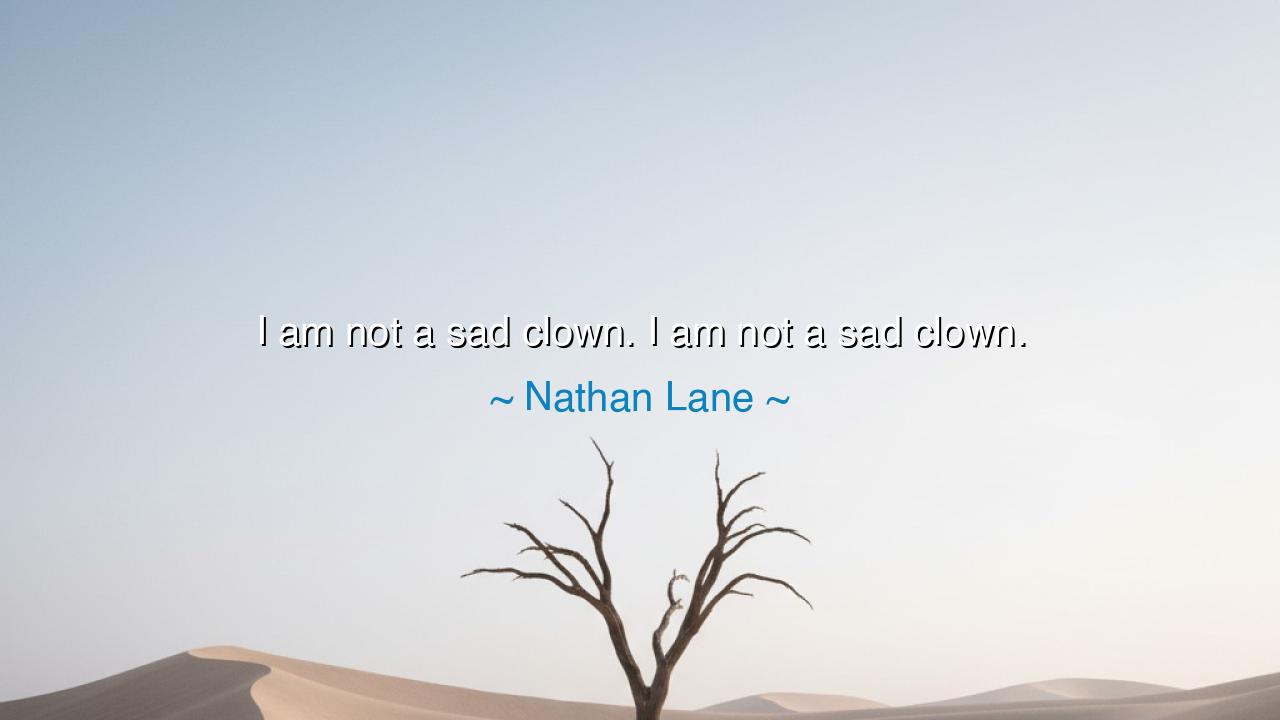
I am not a sad clown. I am not a sad clown.






When Nathan Lane declared, “I am not a sad clown. I am not a sad clown,” he spoke not merely in defense of himself, but as the voice of all who have been misunderstood behind their laughter. His words ring with a quiet defiance, a refusal to be confined by the archetype of the tragic comedian, the artist whose joy on stage masks a private despair. For centuries, the image of the “sad clown” has haunted the world’s imagination—smiling outwardly while bleeding inwardly. Yet Nathan Lane’s repetition, his insistence, carries a different truth: that one may bring joy without being broken, that laughter need not always be born from pain.
The sad clown is an ancient symbol. From the harlequins of Italian commedia dell’arte to the tormented jesters of Shakespeare, the world has long believed that humor springs from sorrow—that the one who makes others laugh must himself suffer. History is filled with artists who seemed to confirm this: Charlie Chaplin, whose Little Tramp evoked both comedy and heartbreak; Robin Williams, whose light shone from the shadow of despair. Yet in his statement, Nathan Lane breaks this inheritance. He proclaims that laughter can come not from emptiness, but from fullness—that to bring joy can itself be an act of health, not of pain. His words are both rebellion and redemption.
There is great wisdom in this denial. For too long, society has romanticized suffering as the price of creativity, as though happiness diminishes art. Nathan Lane’s voice cuts through that illusion like sunlight through storm clouds. He reminds us that to be joyful is not to be shallow, and to be funny is not to be broken. A man who devotes his life to laughter can still be whole, grounded, and full of love. His comedy, though exuberant, need not be a disguise; it can be an offering—an expression of empathy rather than anguish. The artist who laughs freely, without the weight of tragedy, shows a different kind of courage: the courage to live fully in the light.
The ancients knew another kind of laughter—one born not of irony or pain, but of divine celebration. In Greek myth, when Demeter mourned the loss of her daughter, Persephone, it was the bawdy jokes of the servant Iambe that finally made her laugh again. That laughter broke her sorrow and renewed the earth’s fertility. This is the laughter Nathan Lane speaks for: not the laughter of denial, but the laughter that heals. It is a reminder that joy, too, can be sacred, that the ability to bring light to others is not a wound but a gift bestowed by the gods.
And yet, beneath his insistence, there lies a trace of compassion. For by saying “I am not a sad clown,” he acknowledges the existence of the sad clown in others. He knows that many who wear smiles do so to survive, and he honors them even as he frees himself from their shadow. His repetition—“I am not… I am not”—is both a declaration and a prayer, an invocation against being misread, against the world’s tendency to turn every comedian into a tragedy waiting to happen. In his refusal, there is understanding; in his understanding, there is peace.
The meaning of his quote, then, extends far beyond performance. It is a teaching for all who hide behind roles—those who pretend strength while trembling inside, or who fear that joy makes them naïve. Nathan Lane reminds us that we may live brightly without apology. We are not obligated to suffer for our art, our work, or our love. The world may crave stories of tortured souls, but true strength lies in choosing balance over torment, truth over performance, joy over melancholy. To laugh without pain is not weakness—it is wisdom matured.
Let this be the lesson: do not let the world define your depth by your sadness. You may be kind and still strong, joyful and still profound. The flame of laughter does not have to burn your heart to shine brightly for others. Like Nathan Lane, learn to speak the truth of your wholeness again and again, until the world believes it: You are not a sad clown. You are a bringer of light, a keeper of joy, and your laughter is not a mask—it is your gift to the world.






AAdministratorAdministrator
Welcome, honored guests. Please leave a comment, we will respond soon